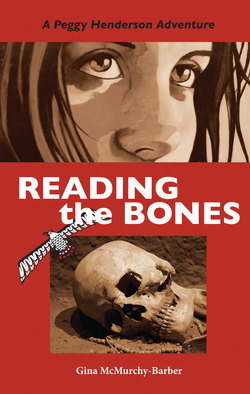Читать книгу Reading the Bones - Gina McMurchy-Barber - Страница 5
На сайте Литреса книга снята с продажи.
PROLOGUE
ОглавлениеTalusip wipes tears from her face. Her soft skin is creased and ruddy as red cedar bark. Several of the village men lower the body of her husband, Shuksi’em, onto a bed of crushed mussel and clam shells. Now he will lie among his old friends and the young who did not survive.
“Shuksi’em suffered greatly near the end of his life when the sun left the village for many days,” whimpers his wife to those near enough to hear. “He never complained, but I know his bones screamed with pain when the rains fell and winds blew. And his back — bent like tall grass heavy with seed — gave him so much trouble he no longer took his daily walks down to the shore to watch the men bring in the salmon. With the days of winter almost upon us, he dreaded what his life would become.”
Now that Shuksi’em is dead, though, his crooked old spine makes it easier for the men to place him on his side like a sleeping baby. Talusip puts Shuksi’em’s tools beside his curled body. She knows he will need them in the next world. Then she tucks a large piece of fresh smoked salmon near his head and hopes it is enough to tide him over.
The villagers huddle together, backs against a light rain. Some of the women howl with sorrow into the wind. Others whisper in agreement how much the old man will be missed.
“We thank the spirit of Shuksi’em for leaving us many fine storage boxes made from sturdy cedar, each finished with our family’s crest — the Bear,” says the clan elder. “And for our giant feast dishes carved from the yew tree. And when the men fish at the river’s mouth with his prized bone harpoon points they will send thanks to his spirit.”
The young ones remember the times they sat on their mothers’ knees listening to the stories Shuksi’em told them. Sometimes his tales were of wisdom or courage. Others, like the one about Quamichan, the flying wild woman who eats children, frightened them so much that they never roam too far from the village.
Talusip recalls the day before death took Shuksi’em how he struggled to finish a wooden ceremonial bowl embraced by the arms and legs of a great frog. It is a gift for her granddaughter’s wedding. Talusip’s son, Q’am, wants to keep it, but she is afraid of the thing. She has decided to trade the bowl with the Chinook the next time they come to the village.
Taking the large butter clam filled with a paste made of red ochre and fish oil, Talusip begins to spread the mixture over her husband’s lifeless body. Her hand trembles and her heart stings. Now she is satisfied that all has been done to prepare her mate for his journey. She steps away and watches the men cover Shuksi’em with a blanket of broken shells, sand, and seaweed in the way her people have done since the Great Spirit created them. Here his body will stay, a short distance from his village, near the shores where he netted fish, close to the forest where he once hunted. Here he will stay forever.
